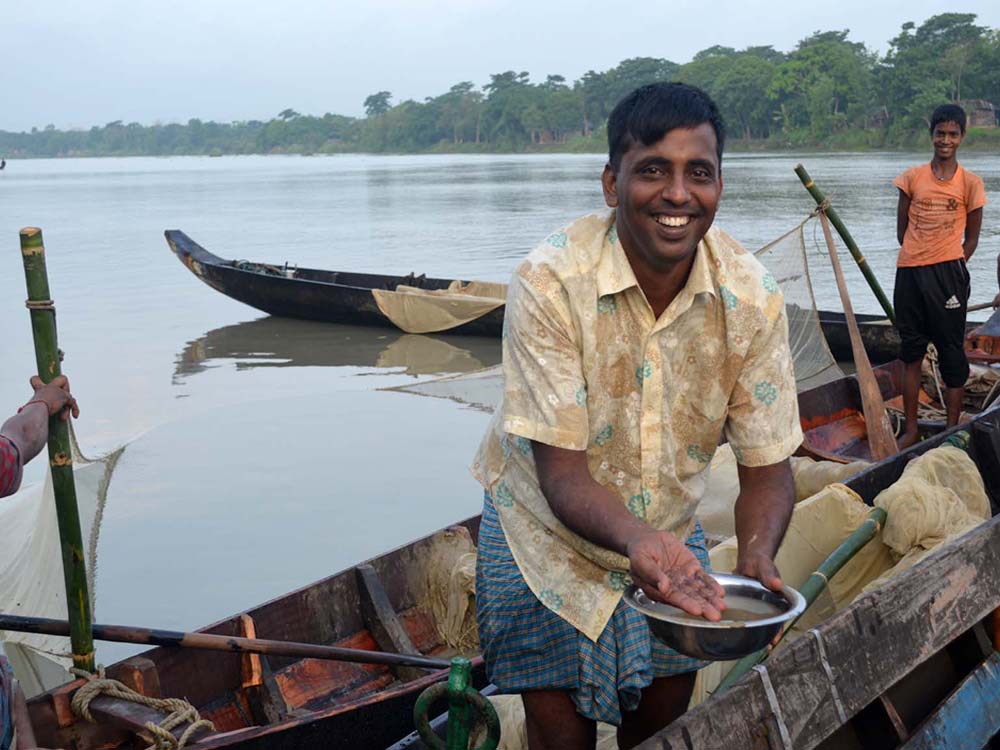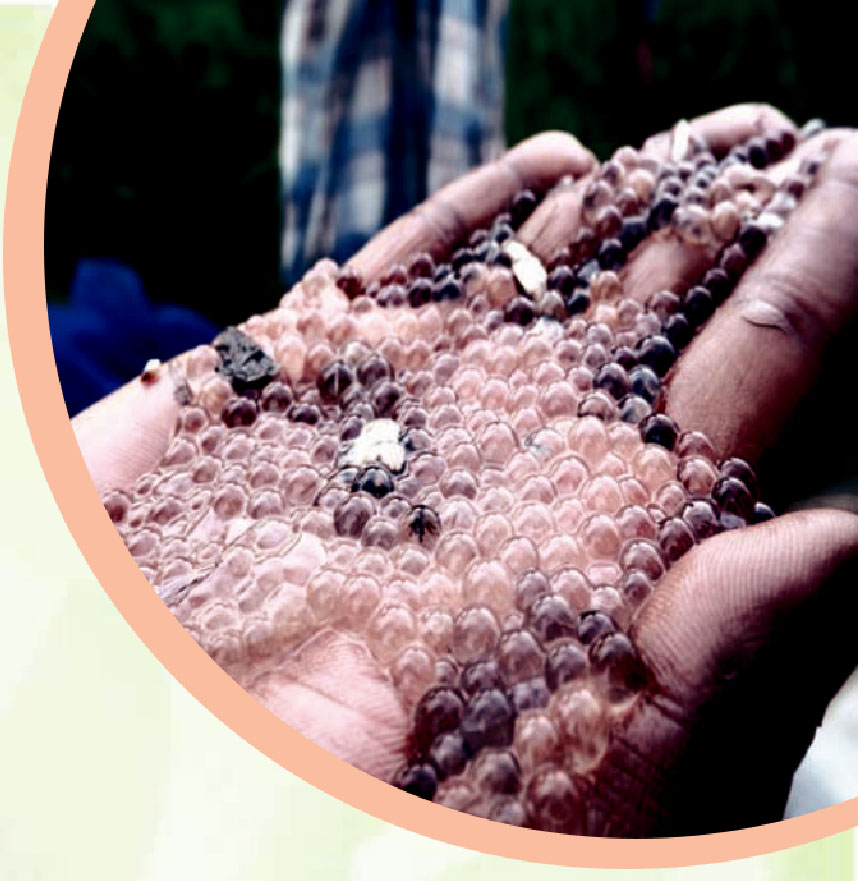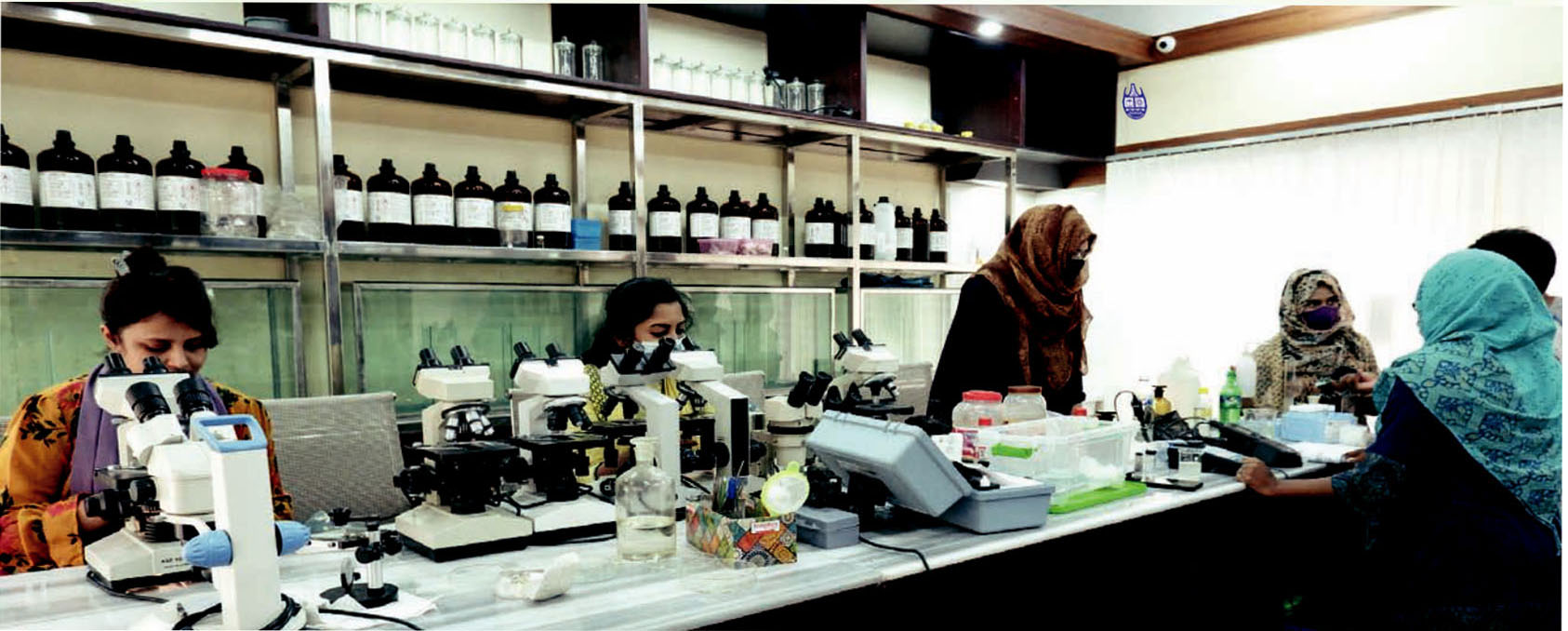IDF has been implementing this project on “Conservation of Natural Breeding Ground of Fishes and Development in the Halda River” under the “Promoting Agriculture Commercialization and Enterprises (PACE)” Project of PKSF with the assistance of International Fund for Agricultural Development (IFAD) for the last 3 years.
Halda River occupies an important position as a natural breeding ground of Indian major carps among existing open inland water bodies of Bangladesh. This river is unique and distinct due to genetically purity of fertilized spawn of Rui and other carp fishes. This river also plays significant role in livelihoods of people who are egg collectors and hatchers. About 40-50 thousand kilograms of eggs could have been collected from Halda River some 50 years back. But only 12 kgs of rui fish eggs were possible to be collected in 2016. Such disparity of the Halda River has never been seen earlier.
Some other species of fishes that were available earlier seemed to have become extinct now from Halda River. Amongst the extinct species of fishes, important ones are Bani Koksa (Bailiusbarila), GhorPoia (Garragotyla), Guijja Ayre (Sperataaor), Pangas (Pangasius pangasius), Mad/Kata Chanda (Pseudambassisbaculis), Kata Bhukh, GoniChapila (Gonialosamanminna), Baila (Stigmatogobiussadanundio), Meni/Bheda (Nundus nandus), Koi Punti (Puntius sp), Kuichcha (Monopteruscuchia), Rata Borua (Moringuaraitaborua) etc.


Halda river is under threat to destruction because of its different types of anthropogenic haz-ards including indiscriminate catching and killing of the brood fishes by using illegal gill net, and destruction of natural habitation of fishes. Navigation of the engine operated water vehicles, cutting of the river’s serpentine bends and oxbow lakes, disposal of industrial effluents and sewage contamination, unplanned construction of a good number of sluice gates and rubber dams for irrigation purpose, massive quarry of sands from river bed illegally by a section of unscrupulous traders, use of excessive toxic insecticides on both sides of river banks, tobacco farming in upstream area of the river etc. are mostly the reasons for such conditions.
Today as the nation’s and possibly south Asian’s major natural breeding ground for Indian major carps is in threat to destruction because of natural disasters and different types of anthropogenic hazards including indiscriminate catching and killing of the brood fishes by using illegal gill net, destruction of natural habitation of fishes. Navigation of the engine operated water vehicles, cutting of the river’s serpentine bends and oxbow lakes, disposal of industrial effluents and sewage contamination, unplanned construction of a good number of sluice gates and rubber dam for irrigation purpose, massive quarry of sands from river bed illegally by a section of unscrupulous traders, using excessive toxic insecticide in cultivation lands near to river bank, tobacco farming upstream area of the river etc. are mostly significant.In 1945, around 5,000 kg fertilized eggs of major carps were laid in the River Halda. But only 12 kg fish roe were possible to collect in 2016. As far as memory goes, such disparity of the Halda River has never been seen earlier.
In this state, for conserving natural breeding ground of major carps in the River Halda has been taken as a value chain project “Conservation of Natural Breeding Ground of Fishes and Development Project in the Halda River” in order to conduct various conservational endeavors and development activities. Within the conservational endeavors- patrolling around the sanctuary announced area of the river during spawning time, tree plantation on the both sides of riverbank, conducting research on protecting natural environment of the river, arranging workshops for increasing public awareness, creating alternative livelihood of egg collectors. Through involving them in-sustainable income generating activities, increasing capability of production of lethal insecticide free vegetables, supplying modern and developed technologies (e.g. sex pheromone trap, organic pesticide and organic fertilizer) for production of insecticide free vegetables, improving efficiency in hatching fish fries from fertilized spawn and management of hatchery, providing training on hatching strategy in mud- made scoop to produce carp fries on the riverbank and carp fish culture, expanding fish market of Halda carp fries and building relation among people who related to the Halda River, training on navigation of water vessels and fishery legislation for growing public consciousness etc. are the main. The progress of activities are reviewed by the technical and expert committee on regular basis. The recommendation of these committees are implemented with carefully.
Goal of the Project
To intensify the production of fish, conserve the species of fish from threat to extinction and create the opportunity of livelihood of entrepreneurs by conserving and developing natural breeding ground of carp fishes (Rui/ Rohu, Catla, Mrigal and Kalibaush) in the Halda River.
Objectives of the Project
With the help of government concerned department and administration:
Working Area of the Project
Activities Performed during 2020:
A number of activities were carried out during the year 2020. In view of the nature and problems prevailing in the river Halda, the activities varied from assisting the fishermen to making aware of the related stakeholders to liaise with local administrations. The following descriptions provide the activities performed during the year 2020.
i) Introducing modern techniques of hatching:
IDF has been working since 2016 on introducing the modern techniques of hatching in earthen ponds in order to produce fry from eggs. So far, 157 poor fishermen were selected and trained on this technology. During the year 2020, all these farmers were being supported to maintain and use these ponds for the purposes.
ii) Distribution of drums for disposal of wastes:
Drums were distributed from the project at the levels of Pouroshovas and Unions to assist them to be able to dispose of the wastes easily. These were distributed at the Raozan Pourashova and at Gahira, Binajuri, Paschim Guzara and Noajispur unions of Raozan upazila. The unions of Hathazariupazila where drums were distributed covered the unions of Mekhal, Garduara, Uttar Madrasa, Dakshin Madrasa and Burishchar.
iii) Alternate livelihoods for tobacco cultivators:
Cultivation of tobacco along the riversides of Halda was being pursued by the hilly farmers of Manikchoriupazila that affected the Halda river. These farmers were trained and motivated to leave the tobacco cultivation and practice alternate farming. With this purpose, some farmers were persuaded to establish demonstration plots of various other profitable crops. About 40 farmers were assisted to establish demonstration plots of papaya gardens, 12 farmers developed Nagpuriorange, 10 farmers established Rambutangardens, 5 farmers yellow lemon and 2 farmers established dragon gardens. In addition, 100 farmers were given saplings, each one receiving 1 Taiwani mango, 1 Vietnam Jackfruit and 1 Sharifa fruit saplings. Potato seeds amounting to 30 kg were given to each of 40 farmers, and 5 kg of groundnut seeds were distributed to each of 15 farmers.
iv) Educational support to fishermen’s children:
About 50 students were identified who were children of the fishermen of Raozan and Hathazari upazila areas earning their livelihoods from the Halda River. Each student was awarded BDT 4,000 as a support to meet his/her educational expenses.
v) Awareness campaign for school/madrasa students:
During the months of January and February 2020, a number of campaigning activities were carried out to the students of schools and madrasas situated along the river sides with a view to explaining the history of Halda river and its importance as a natural breeding ground of carp and other fishes and its unique and distinct features due to genetically purity of fertilized spawn of these fishes.
vi) Awareness meeting with Imams (religious leaders):
Some motivational meetings were held with the Imamsof all mosques of the river sides. The purposes of these meetings were to make the Imams aware about the importance of Halda River and its unique role in serving as breeding ground of mother carps in releasing the eggs. It was expected that theImams would play roles in motivating the local people, fishermen not to catch mother fishes, rather they take care of them.
vii) Meeting with local administration:
Meetings were held at the Pouroshova and at Upazila levels to review the present situation and discuss the problems. The meetings arrived at the decisions of what to be done in the areas. The meetings were attended by the local level representatives like union chairmen, councilors of Pourashova, different upazila and union officials and IDF personnel. These meetings were presided over by the Upazila Nirbahi Officers.
viii)Record breaking yield of eggs in 2020:
This year in 2020, a record breaking amount of 25,536 kg of eggs were produced in Halda River. This was the highest production in last 14 years. Productions of eggs in the previous years were 1,680 kg, 22,680 kg and 7,000 kg in the years 2017, 2018 and 2019 respectively. Although there were contributions of many agencies and organizations – both govt. and non-govt.- behind this achievement, but the contributions of IDF, a partner organization of PKSF, was also remarkable and had been applauded by many including the press. The steps that IDF had taken throughout the year were praiseworthy. Activities conducted and actions taken by IDF could be briefly mentioned here. IDF staff members and its volunteers had worked hard in maintaining an environment favorable for mother-fishes to lay eggs safely.
The steps taken included i) guarding the Halda River in a manner that the river remains safe for natural breeding,
- assist the local administration to stop illegal fishing, create obstacle to use engine driven boats and dredgers,
- motivate owners and employees of locally established mills and factories along the river sides not to spoil the river water by draining wastes and chemicals, iv) taking steps to stop tobacco cultivation, v) building social awareness among local people by orienting the farmers, fishermen, religious leaders etc., and vi) above all, assisting fishermen with modern technologies
on hatchery and so on. Besides, men-made obstacles were found less this year due to Corona-19 pandemic.
ix) Technical committee meeting:
There is a Technical Committee composed of subject matter specialists. The committee meets regularly and the members provide technical guidance on the plan and activities of the works to be performed in the Halda river.
x) Halda River Research Laboratory:
The Halda River Research Laboratory was established in the campus of Chattogram University in collaboration of IDF and PKSF. The laboratory was equipped with necessary machineries and equipment. Regular research work was being carried out in the laboratory.
Halda River Research Laboratory
Halda River Research Laboratory was established at the Biological Faculty of Chittagong University jointly financed by PKSF and Integrated Development Foundation (IDF). The laboratory was set up with the main objectives of facilitating specialized research like physical, chemical and biological parameters of the environment and ecosystem of rivers; making an archive of Halda River resourc-es, history, culture and heritage; developing Halda River indigenous technology and checking up Halda River health regularly.
Prof. Manzoorul Kibria of Zoology Department and also an expert on river, was given the charge of the Laboratory. Fishermen who collect spawns from the river, students of Zoology department and interested entrepreneurs are being provided training at the laboratory.


